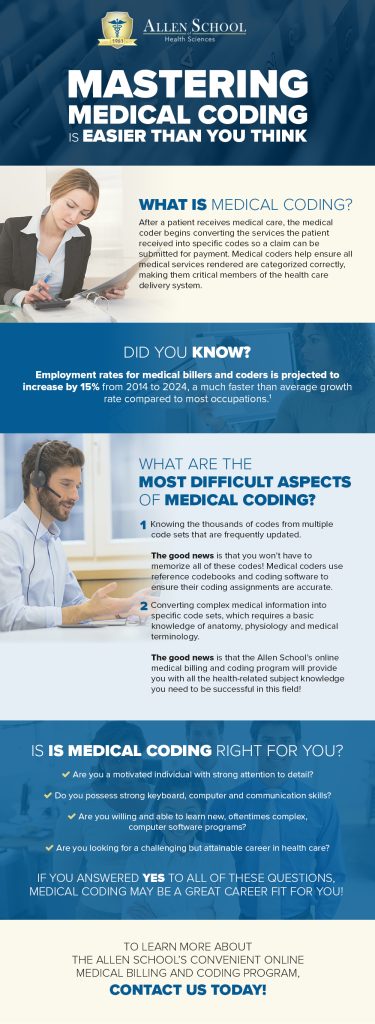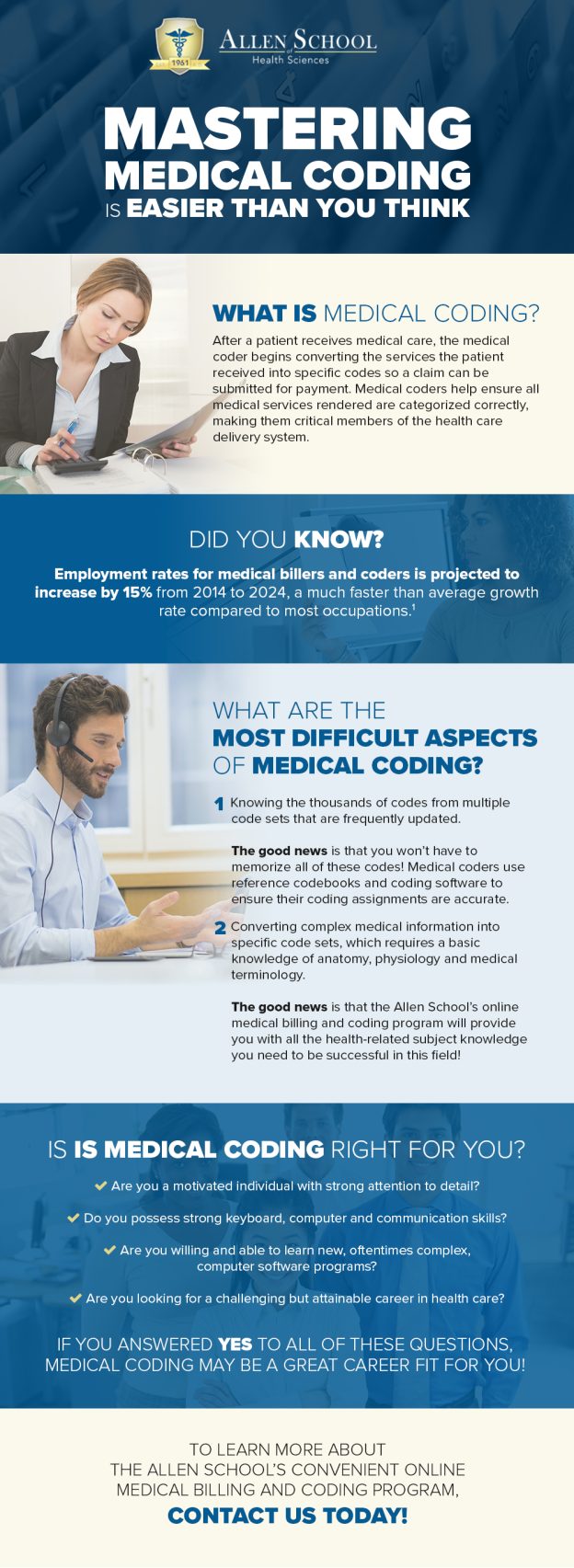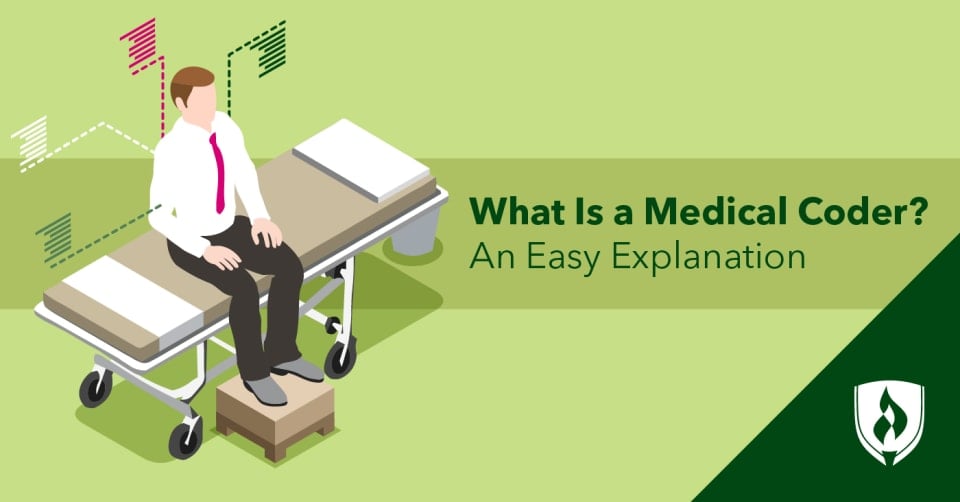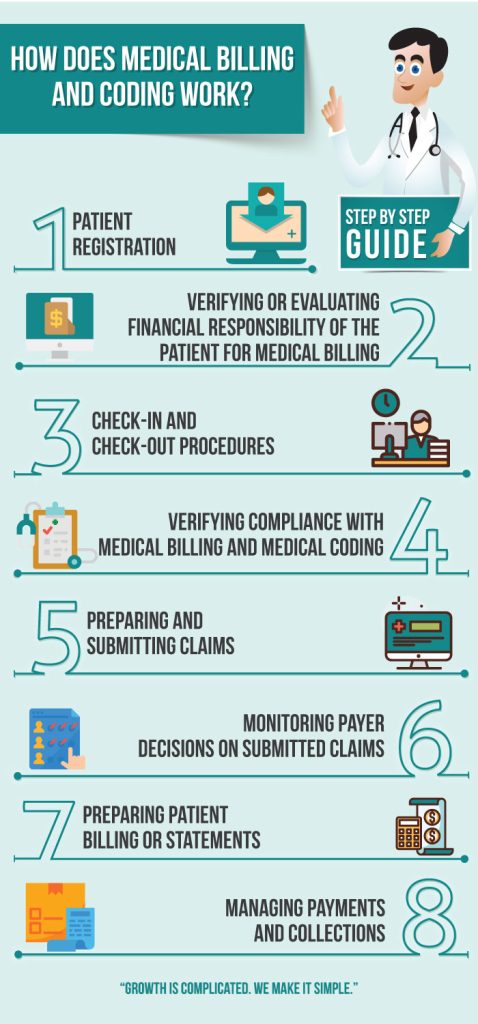Medical coding is a complex discipline that requires precision, attention to detail, and an in-depth knowledge of medical terminology and coding guidelines. Many individuals interested in pursuing a career in the medical field often wonder – is medical coding easy or hard? This article aims to provide insight into the realities of medical coding, exploring the challenges and rewards associated with this profession. By understanding the complexities involved, individuals can make informed decisions regarding their career aspirations in the healthcare industry.
Understanding Medical Coding

This image is property of www.allenschool.edu.
What is Medical Coding?
Medical coding is a crucial component of the healthcare industry that involves the transformation of diagnoses, procedures, and medical services into universally recognized alphanumeric codes. These codes are used for various purposes, such as billing, insurance claims, data analysis, and research. By accurately translating medical information into codes, medical coders ensure that healthcare providers are reimbursed appropriately and that accurate data is available for analysis and decision-making.
Importance of Medical Coding
The importance of medical coding cannot be overstated. It serves as a bridge between the healthcare providers, insurance companies, and regulatory agencies, enabling smooth and accurate communication. Medical coding plays a vital role in streamlining billing processes, reducing errors, ensuring compliance with regulations, and facilitating accurate healthcare data analysis. Without proper coding, the financial and operational aspects of the healthcare industry would be severely affected, leading to delayed payments, increased denials, and compromised patient care.
Different Types of Medical Coding
Medical coding encompasses various coding systems, each serving a specific purpose. The two most commonly used coding systems are the International Classification of Diseases (ICD) and the Current Procedural Terminology (CPT).
ICD codes, developed by the World Health Organization (WHO), capture diagnoses and medical conditions. These codes provide detailed information about a patient’s illness, injury, or symptoms, allowing healthcare professionals to accurately document and classify health conditions.
On the other hand, CPT codes, developed by the American Medical Association (AMA), are used to identify medical procedures, services, and treatments. These codes are essential for proper reimbursement and documentation of medical services provided.
In addition to ICD and CPT codes, medical coders may also deal with other coding systems, such as Healthcare Common Procedure Coding System (HCPCS) codes, which include supplies, equipment, and drugs used in medical procedures.
Skills and Knowledge Required

Attention to Detail
Medical coding requires exceptional attention to detail. Each medical record contains a vast amount of information that must be accurately coded. The tiniest errors or omissions can lead to significant repercussions, such as denied claims or incorrect billing. It is crucial for medical coders to possess a meticulous nature and diligently review medical records to ensure accurate coding.
Analytical Skills
Analytical skills are vital for medical coders to interpret complex medical documentation and translate it into appropriate codes. They must have the ability to analyze medical reports, understand the physician’s intent, and select the most accurate codes that reflect the diagnosis or procedure performed. Strong analytical skills enable coders to navigate through intricate medical terminologies and identify the relevant information required for coding.
Medical Terminology Knowledge
Medical coders must have a solid foundation in medical terminology. Understanding the language of medicine is essential for accurately coding diagnoses and procedures. Knowledge of medical terms, anatomical structures, and physiological processes allows coders to accurately interpret medical documentation and select the appropriate codes. Without a comprehensive understanding of medical terminology, it would be challenging to accurately translate medical information into codes.
Anatomy and Physiology Understanding
In addition to medical terminology, medical coders need a fundamental understanding of anatomy and physiology. This knowledge enables them to correctly identify body systems, organs, and processes involved in a patient’s diagnosis or procedure. Understanding the human body’s structure and how it functions is crucial for accurately coding medical records. Without a solid grasp of anatomy and physiology, coders may struggle to assign the correct codes and accurately represent the medical services provided.
Coding Certification and Education
Medical coding is a specialized field that requires specialized knowledge and skills. Many employers prefer or require medical coders to possess coding certifications, such as the Certified Professional Coder (CPC) credential offered by the AAPC (American Academy of Professional Coders) or the Certified Coding Specialist (CCS) credential offered by AHIMA (American Health Information Management Association). These certifications validate a coder’s proficiency in medical coding and demonstrate their commitment to professional development. Additionally, formal coding education programs and courses provide coders with in-depth knowledge and hands-on training, ensuring they are well-prepared for the complexity of the job.
Complexity of Medical Coding
Varying Levels of Difficulty
Medical coding can range from relatively straightforward cases to highly complex scenarios. The difficulty of coding depends on various factors, including the complexity of the patient’s condition, the specificity of documentation, and the coding system being used. While some cases may involve straightforward codes with clear guidelines, others may require extensive research, interpretation, and coding decision-making. The complexity of medical coding makes it a challenging field that demands continuous learning and adaptability.
Code Changes and Updates
Medical coding is continuously evolving and subject to regular updates and revisions. As medical science advances and new procedures, diagnoses, and technologies emerge, coding systems must be updated to reflect these changes. Keeping up with these updates can be challenging, as it requires medical coders to stay informed and knowledgeable about the latest changes and guidelines. Failure to stay updated may result in incorrect coding, leading to denials, compliance issues, and financial losses.
Different Coding Systems
The existence of multiple coding systems adds to the complexity of medical coding. Coders must not only be proficient in using the primary coding systems, such as ICD and CPT, but also be familiar with other coding systems, such as HCPCS or specialty-specific coding systems. Each coding system has its own set of rules, guidelines, and modifiers, necessitating a comprehensive understanding and the ability to apply the correct codes accurately. The complexity of managing multiple coding systems requires coders to have an extensive knowledge base and the ability to navigate through various coding references and resources.
Insurance and Reimbursement Complexity
Medical coding is not solely about translating medical information into codes; it also involves ensuring accurate reimbursement from insurance companies. The complexity lies in understanding insurance policies, coverage limitations, and coding guidelines set by different payers. Coders must be familiar with various insurance plans, their requirements, and the specific rules associated with billing and reimbursement. This complexity extends beyond coding and into the realm of revenue cycle management, requiring coders to be well-versed in medical billing practices and compliance regulations.
Challenges Faced by Medical Coders

Coding Accuracy
One of the major challenges faced by medical coders is maintaining accuracy in coding. The responsibility of accurately translating complex medical information into codes lies with the coder. Any errors, omissions, or incorrect codes can lead to financial losses, delays in reimbursement, and potential legal issues. Achieving and maintaining accuracy requires not only a solid foundation in coding knowledge but also continuous learning, attention to detail, and adherence to coding guidelines and regulations.
Time Management
Medical coders often face demanding workloads and tight deadlines. They must effectively manage their time to ensure that they complete coding tasks accurately and within designated timeframes. The volume of medical records to be coded, the complexity of cases, and the need for thorough documentation review can create time constraints and pressure. Successful medical coders develop effective time management strategies, prioritize tasks, and maintain focus to meet deadlines while maintaining accuracy and quality.
Stress and Pressure
The demanding nature of medical coding can lead to high levels of stress and pressure. Coders must continuously process large amounts of information, make precise decisions, and meet productivity targets. Additionally, they may face the pressure of critical coding audits and compliance reviews. The potential impact of coding errors on reimbursement and revenue generation can contribute to the stress experienced by medical coders. Effective stress management techniques, along with supportive work environments, can help coders cope with the demands of the job.
Keeping Up with Industry Changes
The healthcare industry is dynamic, with new procedures, technologies, and guidelines constantly emerging. Medical coders must keep pace with these changes to ensure accurate coding and compliance with regulations. Staying updated requires continuous learning, attending workshops, participating in webinars, and reading industry publications. Keeping up with industry changes can be challenging, particularly when combined with the demands of daily coding tasks. Coders who actively engage in professional development and seek opportunities for learning and growth are better equipped to navigate the ever-changing landscape of medical coding.
Factors Affecting the Perception of Difficulty

Individual’s Background and Experience
The perception of the difficulty of medical coding can vary based on an individual’s background and prior experience in healthcare or coding-related fields. People with a background in healthcare, such as nurses or medical billers, may find it easier to transition into medical coding due to their existing knowledge of medical terminology, anatomy, and clinical practices. Similarly, individuals with prior coding experience may have an advantage in understanding coding principles and guidelines. However, even individuals without prior healthcare or coding experience can succeed in medical coding with the right training, education, and dedication.
Effective Training and Guidance
The quality of training and guidance received plays a significant role in how difficult medical coding may appear. Comprehensive and well-structured coding education programs or courses provide coders with the necessary foundation and skills to perform their job effectively. Effective training programs cover medical terminology, coding system guidelines, anatomy, physiology, and coding practice scenarios. Additionally, experienced mentors or supervisors who provide ongoing guidance and support can help coders overcome challenges and improve their coding proficiency.
Work Environment and Support
The work environment and the level of support received contribute to the perceived difficulty of medical coding. A supportive work environment that fosters teamwork, open communication, and professional development can positively impact a coder’s confidence, motivation, and overall job satisfaction. Collaboration with colleagues and access to resources, coding references, and software tools can enhance a coder’s performance and ease the challenges associated with coding complexity.
Intrinsic Motivation and Dedication
Intrinsic motivation and dedication are key factors that influence a coder’s perception of the difficulty involved in medical coding. Medical coding requires continuous learning, adaptation to industry changes, and attention to detail. Coders who possess an innate interest in healthcare, coding, or problem-solving, coupled with dedication and passion for their work, are more likely to embrace the challenges and persist in their pursuit of coding proficiency. Intrinsic motivation fuels the drive to continually improve and overcome difficulties, contributing to a successful career in medical coding.
Advantages of Medical Coding

Job Stability and Demand
Medical coding offers excellent job stability and demand. As the healthcare industry continues to grow, so does the need for skilled medical coders. Healthcare providers, insurance companies, and government agencies rely on medical coders to accurately document and code medical services. The demand for medical coders remains consistent, providing opportunities for long-term employment and job security.
Opportunities for Career Growth
Medical coding is a field with ample opportunities for career growth. Coders can progress from entry-level positions to more advanced roles, such as coding auditors, coding educators, or coding managers. Additionally, professionals who demonstrate exceptional coding knowledge and expertise may advance into leadership positions within the healthcare industry or pursue consulting roles. Continuous learning, staying updated with industry changes, and obtaining coding certifications are key factors that contribute to career growth in medical coding.
Remote Work Possibilities
One of the advantages of medical coding is the potential for remote work. With the increasing use of electronic health records (EHR) and coding software, many healthcare organizations offer remote coding opportunities. Remote coding allows coders to work from the comfort of their own homes or any location with internet access. This flexibility in work arrangements provides a better work-life balance and eliminates commuting time. Remote coding also opens up opportunities for coders to work for organizations across different regions or even internationally.
Contributing to Healthcare Industry
Medical coders play a vital role in the healthcare industry by ensuring accurate and efficient documentation, billing, and data analysis. Their work directly impacts revenue generation, reimbursement, and decision-making processes. Accurate coding facilitates proper patient care, enhances healthcare data integrity, and supports research and clinical studies. By accurately translating medical information into codes, medical coders contribute to improving the overall quality and efficiency of healthcare delivery.
Resources for Learning Medical Coding

Online Courses and Certification Programs
Online courses and certification programs offer a flexible and accessible way to learn medical coding. Numerous educational institutions, professional organizations, and private training providers offer online coding courses designed to teach coding principles, guidelines, and best practices. These courses provide a structured curriculum, interactive learning materials, and assessments to validate coding proficiency. Completing a recognized online coding course or certification program can equip aspiring medical coders with the knowledge and skills required for entry-level positions.
Textbooks and Study Guides
Textbooks and study guides remain valuable resources for learning medical coding. These resources provide comprehensive coverage of coding guidelines, medical terminology, anatomy and physiology, and coding principles. Well-known coding textbooks, such as those published by reputable publishers like the AMA, AAPC, or AHIMA, offer in-depth explanations, coding examples, and practice exercises. Coders can use textbooks and study guides to enhance their understanding, reinforce concepts, and practice coding scenarios.
Industry Websites and Forums
Industry websites and forums are excellent sources for staying updated with coding guidelines, industry news, and professional discussions. Websites of professional organizations like the AAPC and AHIMA provide coding resources, articles, and forums where coders can seek guidance and exchange knowledge with peers. Online forums and communities dedicated to medical coding enable coders to ask questions, share coding scenarios, and receive feedback from experienced coders. Engaging with the coding community and staying active on industry websites can enhance a coder’s learning and professional development.
Mentorship and Networking
Mentorship and networking opportunities can greatly assist coders in their learning journey. Connecting with experienced coders or seeking mentorship from professionals in the field can provide valuable insights, guidance, and support. Mentorship programs offered by professional organizations or informal networking within coding communities can help coders overcome challenges, clarify doubts, and gain practical coding experience. Building a strong professional network not only fosters personal and professional growth but also opens doors to potential job opportunities and career advancement.
Tips for Success in Medical Coding

Continual Learning and Professional Development
Continual learning and professional development are essential for success in medical coding. The healthcare industry is constantly evolving, and medical coders must keep up with the latest coding guidelines, technological advancements, and industry changes. Engaging in ongoing education, attending coding workshops or conferences, and pursuing coding certifications demonstrates a commitment to learning and improvement. Continuous learning ensures that coders stay updated, maintain coding accuracy, and remain valuable assets to healthcare organizations.
Building a Strong Foundation
Establishing a strong foundation in medical coding is vital for long-term success. This includes thoroughly understanding and mastering coding principles, guidelines, and coding systems. Building a strong foundation also involves developing a solid understanding of medical terminology, anatomy, and physiology. Coders should invest time in comprehensive coding education or courses, study coding references thoroughly, and practice coding scenarios to reinforce their knowledge and skills. With a strong foundation, coders can effectively tackle complex cases, make accurate coding decisions, and excel in their coding careers.
Developing Efficient Coding Techniques
Striving for efficiency in coding is crucial for meeting productivity targets and maintaining accuracy. Medical coders must develop effective and efficient coding techniques to streamline their workflow. This includes utilizing coding software, leveraging coding references, and adopting coding shortcuts or mnemonics to expedite coding processes. Developing efficient coding techniques requires practice, documentation review, and ongoing self-evaluation. Continuous improvement in coding techniques helps coders optimize their productivity without compromising accuracy.
Seeking Support and Collaboration
Medical coding can be a challenging field, but seeking support from colleagues or collaborating with other coders can provide valuable assistance. Collaborating with experienced coders allows for knowledge-sharing, problem-solving, and exposure to different perspectives. Engaging in teamwork or seeking guidance from coding supervisors or mentors fosters professional growth and helps overcome coding challenges. The coding community can provide moral support, advice, and encouragement during times of difficulty, ultimately contributing to a coder’s success.
Conclusion
Balancing Difficulty and Reward Medical coding is a complex and demanding field that requires a unique set of skills, knowledge, and dedication. Coders face challenges such as coding accuracy, time management, stress, and keeping up with industry changes. However, the advantages of medical coding, including job stability, career growth opportunities, remote work possibilities, and contributing to the healthcare industry, make it a rewarding profession for those who are willing to invest the effort.
The Path to Becoming a Skilled Medical Coder Becoming a skilled medical coder requires the acquisition of skills and knowledge through effective training, continuous learning, and professional development. The complexity of medical coding can be managed through attention to detail, analytical skills, medical terminology knowledge, anatomy and physiology understanding, and staying updated with coding changes. By accessing various resources for learning, seeking support, and implementing tips for success, aspiring medical coders can embark on a path toward becoming proficient and respected professionals in the field of medical coding.




